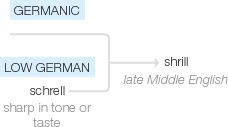Shrill
late Middle English: of Germanic origin; related to Low German schrell ‘sharp in tone or taste’.
wiktionary
From Late Middle English schrille, shirle, shrille(“of a sound: high-pitched, piercing; producing such a sound”), [1] possibly from the earlier shil, schille(“loud, resounding; high-pitched, shrill; audible, clear; melodious, sweet-sounding”), from Old English scill(“sonorous sounding”), [2] of Germanic origin. [3] The r in the word was introduced by analogy to Middle English skrīke, skrīken, scrēmen, [1] possibly to avoid confusion with non- Anglian forms of schelle (modern English shell) where Old English scill(“sonorous sounding”) and scill(“shell”) existed.
The word is cognate with Icelandic skella(“crash, bang, slam”), Low German schrell(“sharp in taste or tone”). [3]
etymonline
shrill (adj.)
late 14c., schrylle "high-pitched, piercing" (of the voice), probably related to Old English scralletan "to sound loudly" and of imitative origin (compare Low German schrell, German schrill "piercing, shrill"). Related: Shrillness; shrilly (adv.).
shrill (v.)
"to sound shrilly," c. 1300, imitative (see shrill (adj.). Related: Shrilled; shrilling.
